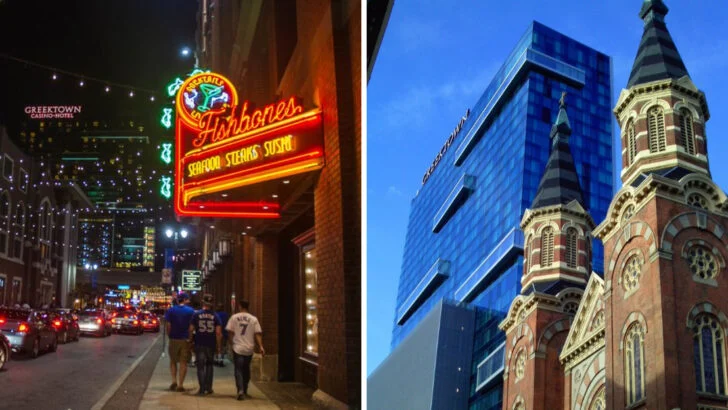Explore Detroit’s Greektown, a vibrant enclave that stands as one of America’s last true Greek neighborhoods.
From its rich immigrant history to its lively cultural celebrations, Greektown preserves the essence of Hellenic tradition.
With family-owned restaurants, historic architecture, and national recognition as a cultural landmark, this neighborhood offers a unique glimpse into Greek-American life.
Each of the nine facts reveals a distinct aspect of why Greektown remains a cherished and authentic community.
Rich Immigrant History
Greektown’s roots trace back to the early 20th century when Greek immigrants flocked to Detroit, drawn by the auto industry’s promise. These pioneers established a community that retained its Hellenic identity despite urban changes.
Today, this authenticity shines through in the neighborhood’s thriving culture, making it a bastion of Greek heritage. Generational continuity has ensured that these traditions endure, a rarity in modern cityscapes.
Visitors can experience this rich history through various cultural events and historical markers that tell the captivating story of Greektown’s foundation.
Architecture That Tells a Story
In Greektown, buildings are more than structures; they’re storytellers. The former St. Mary’s School and the Greektown Casino building exemplify architectural beauty with early 20th-century European influences.
These structures blend Neoclassical and Victorian styles, preserving the neighborhood’s ethnic charm. Walking through Greektown offers a visual feast of these historical aesthetics.
The architecture not only adds character but also serves as a tangible connection to the past, reminding visitors of the neighborhood’s enduring legacy.
Family-Owned Greek Restaurants
Greektown’s culinary scene is a tapestry of family traditions. Restaurants like Pegasus Taverna and The Golden Fleece have been family-run for decades, offering dishes steeped in heritage.
These eateries are more than dining establishments; they are cultural hubs where recipes are passed from one generation to the next. The aroma of moussaka and gyros fills the air, inviting all to partake in a genuine Greek feast.
In an era of chain restaurants, these family-owned ventures represent a delicious slice of authenticity that is increasingly rare.
Vibrant Cultural Celebrations
Greektown pulses with life during its cultural celebrations. Events like the Greek Independence Day Parade and Taste of Greektown showcase vibrant traditions.
These festivities feature traditional music, dance, and cuisine, drawing crowds eager to experience Greek-American pride. The lively atmosphere transforms the neighborhood into a living museum of culture.
Such events reinforce Greektown’s status as a cultural hub, ensuring that Hellenic traditions remain a vital part of the community’s identity for generations to come.
Walkable, Lively Streetscape
Greektown invites visitors to explore its charming streets, alive with sights and sounds. Unlike many urban neighborhoods, it retains a pedestrian-friendly, community-focused atmosphere.
Greek signage, murals, and music animate the streets, providing a sensory feast for those who wander through. The lively ambiance captures the essence of Greek culture.
This walkable environment fosters connection and interaction, making Greektown not just a destination but a joyous experience, echoing the warmth of its people.
Support for Local Greek Businesses
Local businesses drive Greektown’s economy, offering a variety of authentic products. From bakeries to souvenir stores, these enterprises represent the heart of the neighborhood.
Each shop is a testament to Greek entrepreneurship, providing goods that celebrate Hellenic culture. Supporting these businesses keeps money within the community.
In an age of globalization, Greektown’s commitment to local ownership ensures that its unique character and charm remain intact, attracting visitors seeking an authentic experience.
Intergenerational Continuity
In Greektown, traditions pass naturally through generations. Many families maintain deep roots here, running businesses or returning for festivals and holidays.
This intergenerational continuity fosters a strong sense of community. Young people inherit a rich cultural legacy, ensuring that the neighborhood’s authenticity thrives.
Such continuity is becoming rare, but in Greektown, it is a cherished aspect, creating a vibrant tapestry of past, present, and future united by shared heritage.
A Bridge Between Past and Present
Greektown is a testament to balancing tradition and modernity. While adapting to city life, it preserves rich traditions alongside contemporary developments like the Greektown Casino and QLINE.
This blend keeps the neighborhood relevant without losing its identity. It serves as a bridge, connecting past values with present-day innovations.
Visitors can enjoy both the historic charm and modern amenities, making Greektown a unique place where time-honored customs meet the future.
National Recognition as a Cultural Landmark
Greektown’s authenticity has earned it a place as a cultural landmark. Travel guides and critics consistently cite it as a must-visit for genuine Greek-American culture.
This recognition reflects the neighborhood’s success in preserving its unique identity. Visitors from around the world come to experience its lively atmosphere and rich traditions.
Such acknowledgment ensures that Greektown remains a cherished destination, celebrating its status as one of the last true Greek neighborhoods in the U.S.

